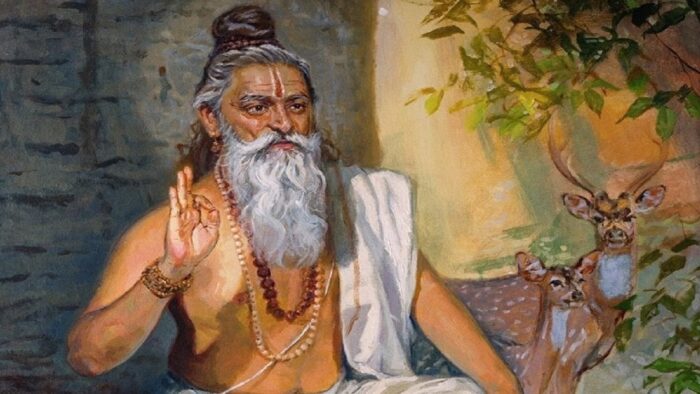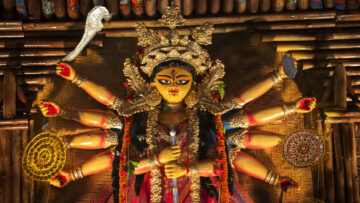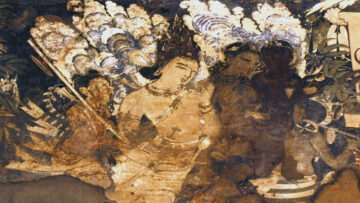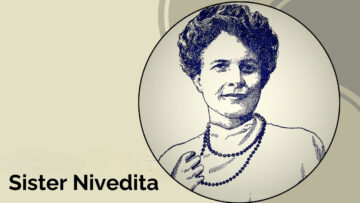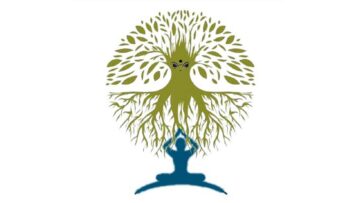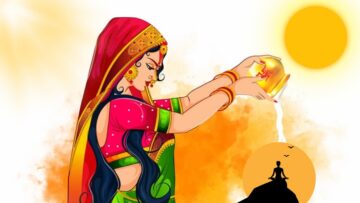……..Continued from Part I
Sikhidhwaja aged both in body and spirit. His body became emaciated, and his mind remained restless.
Meanwhile, Choodala keenly felt Sikhidhwaja’s absence. Even the natural deep calm she had attained, coupled with her transcendent wisdom, was not enough to prevent her from missing her husband and thinking about his wellbeing. She would inhale the fragrant air of sandalwood trees and rue that her husband was not enjoying it with her. The fantastical shapes of the clouds reminded her of his embrace. The cool moon rays would remind her of her conversations with Sikhidhwaja during such nights.
She wondered at her fancy and thought, ‘I have attained stability and wisdom. Yet my mind is disturbed by being separated from my husband. Why am I longing for him? Why do I feel incomplete?’
She decided to visit him. Using her siddhis again, she travelled to his cottage on the foothills of Mandara and saw her husband. Sikhidhwaja was so emaciated and melancholy that she almost did not recognize him at first. His body was bare save his loincloth. Choodala thought, ‘He is so emaciated, and his skin is cracked and darkened. I can feel his misery. There is no one around to share his thoughts with him either. I can instruct him, but he will not take instructions from me because he thinks I am an ignorant woman. I must appear before him in a form that he will respect. After eighteen years of hard penance, his intense emotions have become calmer. He is ready to become a true seeker.”
Choodala took the form of a handsome young brahmacharin[1], wearing earrings, a beautiful string of pearls, sacred thread, white dhoti and angavastra, and appeared before Sikhidhwaja, who rose with alacrity and received his guest with due respect. Sikhidhwaja showed his guest to a seat beside him.
Sikhidhwaja gazed at the handsome young brahmacharin, wearing tripundra[2] marks on his broad forehead. The young man’s thick hair was piled high atop his head. His proportionately built body was neither too tall nor too short. Gratified just gazing upon him, Sikhidhwaja offered him fruits, flowers, and water.
The brahmacharin accepted what was proffered and smiled at his host. “Salutations to you, O Rajarshi[3]! I have visited many great cities and holy places. But I have never been greeted with such love and warmth as today. Your affability and kindness have touched me. Your fortitude in eschewing a great empire for spiritual pursuits in this forest is worthy of admiration.”
Surprised, Sikhidhwaja said, “O Brahmacharin, you know my situation already! You are God-like in your allure, and your affectionate regard for me fills my heart. For some reason, you remind me of my loving wife, Choodala, and I am delighted. Tell me the reason for your visit.”
Choodala in the form of the brahmacharin smiled. “I will tell you. But first, let me introduce myself. I am Brahma’s grandson and Sage Narada’s son. One day, Narada awoke from a state of deep meditation. At that time, he was sitting inside a cave facing River Ganga. Celestial damsels, Rambha, and Tilottama were swimming naked with their friends. For a moment, even the calm and unflappable Sage Narada was distracted. Good or bad, karma follows you, and you must pay off your debts! That said, there is no reason to lose your judgement. Sage Narada decided to preserve his sperm in a pot filled with milk. I was born from that embryo.
“I received all the necessary good samskaras[4] from my father. Soon after that, my father presented me to my grandfather, Brahma. My grandfather was ecstatic after gently testing me to understand my capabilities. He picked me up, sat me in his lap, and named me Kumbha. I could feel I made great strides in my learning, perspicacity, and grasp just by his blessing.
“O Rajarshi! Saraswati is my mother. I am well-versed in all four Vedas. I can travel in any dimension at will. But I am not bogged down by duties. My feet don’t touch the ground, and my body does not get grimy with dirt even though I travel everywhere! I saw you from above while flying through the sky today and came to talk to you.
“I have told you everything about me. Ask me anything if you have any further questions!”
Rama asked, “Acharya, was Choodala not deceitful when she dissembled and lied to her husband? Was she right in doing so?”
Vasishtha said, “You must tell the truth. But sometimes, telling untruth is dharma. You must discern when to tell the truth and when you can tell an untruth. You must act in accordance with whatever delivers the best outcomes for all beings.
“Choodala had no intention harming her husband. On the other hand, she wanted to do her best to make him happy. Besides, she needed Sikhidhwaja to repose confidence in her. So, she did what she had to do. Sikhidhwaja was utterly impressed by Kumbha and trusted him implicitly. Choodala succeeded in her ruse.”
Delighted, Sikhidhwaja said, “I am fortunate that I met a great sage such as yourself! Being a king cannot equal this good fortune.”
Kumbha, who was none other than Choodala, said, “Stop flattering me! Tell me, what is your true purpose in coming to this forest? What did you hope to achieve?”
Sikhidhwaja said, “O Son of Narada, you seem to know everything without being told! I don’t know if I can add anything significant. But I will tell you briefly about my struggles since you ask me.
“As you know, I am Sikhidhwaja, the erstwhile king of Malwa. I was inordinately bothered by the dualities I had to face every day, such as birth and death and joy and sorrow. I came to this forest to find panacea for my angst, hoping I could find the answers in the peaceful solitude. But alas, I have failed. I am working as hard as ever, but peace has eluded me. I am doing unstinting sadhana, but I feel I am withering away. I feel sad, joyless.”
Choodala heard him with deep sympathy and felt very sad for her husband. How was she going to help him?
Kumbha said, “I had asked my grandfather which of the two paths—jnana marga and karma marga, the path of enlightenment or the path of action—was better? And he had told me that jnana marga was better because it liberates you and leads to enlightenment. However, when you follow karma marga, you can structure your time with work, which can also be pleasing and entertaining. Karma is the only path for those who have no proclivity for introspection and sadhana towards jnana. But that said, even the jnanis[5] must work according to their propensities within the framework of varnashrama[6] because such work will benefit the world. The only secret is to work without any desire for the fruits of your labour. If you get attached to the outcomes of your action, your karma will follow you. If you are detached, the stresses will not hound you now, and in the hereafter; the vasanas[7] will not attach to your mind, and the fruits of your karma will not follow you. The path to jnana is to purge your vasanas.
“As my grandfather said, there will be true bliss only when a student diligently receives jnana from the Guru. Otherwise, the hectic activity of karma is only a diversion to while away time. Rajan, karma is like a shroud of security to those without jnana. Virtuous actions serve, but you need jnana to remove the impure vasanas. Therefore, karmas are useful only as they confer pleasures and rewards here and hereafter. If the impure vasanas are destroyed, then the effects of all karmas will cease. When you realize that all is Brahman, ajnana[8] is destroyed, and impure vasanas will never arise. Anyone who understands a mirage knows there is no water there. When the vasanas are destroyed, birth, old age or death will not affect one.”
Kumbha continued his discourse. “When a jiva obtains pure jnana, he cognizes Brahman and will be released from the cycle of birth and death. Jnana alone is worth pursuing. Why do you not ask yourself the most fundamental questions, such as, who you are, why are you here, where you came from, and where you are going?
“Rajarshi, you know there is no point in ritual action beyond a point. Why punish yourself by fasting, japas[9], and asanas[10] and externalizing sadhana? You must find yourself a good Guru[11]. Only then can you realize the outcomes you want.”
Sikhidhwaja was almost in tears. “O Rishiputra[12]! Please accept me as your student and lead me to the right path. I must have waited all my life for a Guru like you. Tell me, what is the right knowledge?”
Choodala said, “Rajan! You must have shraddha[13] first to gain jnana. If you don’t have faith in yourself and your Guru, all our efforts will go to waste. First, listen to your Guru without judgment or prejudice and accept all he says without interruption. You must also fully trust that my objective is your welfare as a Guru. You must have the same faith in me as a child would have in the words of an affectionate father. I will instruct you through parables. A critical examination may come later.
“I will teach you only if you train your mind to concentrate and don’t let it run from one object to another. If you take your Guru’s words lightly, don’t absorb and meditate upon them, they will not help you gain knowledge.”
Sikhidhwaja said, “Acharya, I will receive your words with implicit faith, like I would receive the teachings of the Vedas, and I will meditate upon them.”
Kumbha said, “In olden times, there lived a very learned, but worldly man who possessed great wealth, but did not pursue spiritual knowledge. He decided to search for a gem called Chintamani, famed to give anything he desired to the person wearing it, and started performing rigorous tapasya. The Chintamani gem appeared before him, shining like the moon, but he did not pick it up thinking, ‘This cannot be Chinthamani! This is too shiny! This must be some cheap stone! It cannot be so easy to obtain Chintamani! I have committed too many sins to be worthy of this gem. And though I have performed austerities, I have not yet worked hard enough. Only the virtuous can get Chintamani. I am too ordinary. Surely, I cannot get the rare Chinthamani! I will perform more tapasya and resume my quest!’ With that, he let go of the gem, and the real Chinthamani vanished from his sight.
Kumbha concluded, “The man resumed his quest with redoubled passion. He chanced to meet some Siddhas possessing great psychic powers. Having decided to play a prank upon him, they dropped a broken piece of an earthen bracelet before him. He picked it up with giddy eagerness thinking it was Chintamani, and exulting in its discovery, danced around in joy! Then he returned home and renounced all his wealth, believing that the false gem would fetch him everything he desired. He had no need for his possessions. He left home and retired to the forest because he felt he could only be happy away from the strife and depravity of those around him in his hometown. Thus, this unfortunate man, who had anticipated the enjoyment of real bliss through Chintamani, spurned the object of his quest, after subjecting himself to all kinds of hardships, and degraded himself to the lowest level.”
Kumbha continued, “Listen to my next story now. In the heart of a dense forest, there lived an elephant, a monarch of his breed. A group of mahouts entrapped and fettered him with solid iron chains. The elephant had strong tusks that were long and sharp. Infuriated with his captivity, he used his mighty tusks to free himself in two muhurtas[14]. Sitting atop the elephant, the mahout became giddy during the fight and fell to the ground.
“The tusker, finding him upon the ground, passed by without hurting him. The mahout picked himself up. Though unmolested by the tusker, the dissatisfied and disgruntled mahout went after the elephant with redoubled passion and tracked him to his lair. He dug a trench and covered it up with dry leaves and grass. The elephant fell into the trench as he was wandering in the forest. The mahout captured him again and secured him fast. If only the elephant had trampled upon his enemy and killed him when the mahout lay prostrate before him, he would not have fallen into the trap again. Those who do not understand their enemy will have to face him again. Those that do not have foresight will come to grief.”
Sikhidhwaja asked, “Acharya, I have enjoyed the stories of the Chinthamani gem and the elephant. But why did you tell me these stories?”
Kumbha replied, “You are like the person who went in search of the Chinthamani gem. Although you are aware and well-versed in the concepts, you have not internalized them and achieved equilibrium of mind. To attain true renunciation and rid yourself of strife you gave up your kingdom, wife, friends, and relatives. Your true Chinthamani was right there, but you ran away to this forest. You were gradually gaining true renunciation. But your conception of renunciation was wrong, and you gave up things that would bring you real happiness. You are unhappy because you are misled by your false notion of tapasya. The wise say that those who reject the happiness accessible to them in their daily lives and endlessly chase after imaginary things, are self-destructive and delusional.
Kumbha continued, “Now let us talk about the elephant, which is also really you. The two long tusks are a metaphor for vairagya[15] and viveka[16]. Your ajnana, afflicting you in many ways, is the mahout who sits upon the elephant and goads him on. You are now quivering with the pain inflicted by ajnana like the elephant bound and led by the mahout. You are bound by the fetters forged by desires, stronger and more durable than iron chains. Iron chains wear out in time, but the desires grow. Like the elephant broke loose from its strong bonds, you, too, relinquished your desires and commitments and went to the forest. The mahout’s fall from the elephant is a metaphor for your ajnana being destroyed through your vairagya. When we free ourselves from desires, ajnana is destroyed, and you are released from samsara[17]. If the lure of wealth is abandoned through asceticism, ajnana will only be suppressed. But if the delusion of wealth is destroyed through viveka, then ajnana will be destroyed. When you reached this forest, your ajnana was suppressed, but you did not uproot it by practicing complete renunciation, which caused you further pain. Now the excavation of the trench by the mahout is a metaphor for the renewed pain you are suffering through the growth of ajnana. The leaves and dry grass spread upon the pit refer to your actions during your severe tapasya.”
Kumbha summed up his evaluation. “Though you have strong concepts, you have not internalized them. You have been too restless and held on too tightly to everything. To internalize your learning, you need calm and stillness. Tyaga[18] is essential to spiritual progress. With absolute renunciation, you get released from attachment and consequently, worry. When you constantly worry, your mind gets clouded and loses clarity.
“You started on the right path when you decided to embrace disinterest. You gave up your wife, riches, and kingdom. But you clung to your tapasya and sadhana so hard they fettered you. The life of a forest dweller became your lure and attachment. They defined you, and your ego became enmeshed in your identity as a forest dweller and your attachment to your sadhana. You are blissful when you eschew your ahankara[19]. Remember the parable of Chintamani? Letting go of your cares and attachments is like finding Chintamani, the key to eternal bliss. But you have embraced your sadhana like that hunter sought the cowrie shell. Please understand that your sadhana has not benefitted you in any way.
“Now, introspect and decide what you want. Is it tyaga or sadhana? Your wife Choodala had given you excellent advice, which she incorporated into her own life and became a philosopher of great merit. If you had followed her advice, you would not have gotten lost in the woods as you have. At that time, you chose tyaga and decided to eschew everything. But you did not live by your own chosen principle. Why?”
Sikhidhwaja was distraught. His incoherent words tumbled out in agitation. “What have I not given up? Did I not give up my kingdom and riches? Did I not give up my gem of a wife, Choodala? And you say I have not given up anything? What do you mean?”
Kumbha smiled. “But King! Riches and land are not yours to begin with. Did you bring it with you when you were born? You cannot take your own body with you when you go! You cannot even use the things you believe you own as you wish! Therefore, you cannot give up what is not yours!
“You have not given up that one thing you truly own, which is still with you. Can you give it up?”
Sikhidhwaja stood up excitedly. “If the kingdom was not mine, perhaps this cottage surrounded by mountains, covered in lush foliage, and watered by streams is mine! I will formally abandon the feeling of ownership I have over this!”
Kumbha said, “But these are not yours! And you cannot give up what is not yours!”
Sikhidhwaja said in agitation, “In that case, I am giving up my little pots and pans, my water carrier, and staff! What else do I own? Yes, my japamala[20]! Yes! I don’t want them!”
Sikhidhwaja tore the deerskin from his shoulder and threw it away. He took his wooden sandals, staff, and water pot, then walked about collecting everything he could find. Gathering them into a pile, he set them on fire. Then he put the rosary carefully on top of the pile and said, “Dear Japamala, I was deluded when I did my sadhana and used you for counting useless mantras. Now I shall rest. I have no further use for you!” Finally, he tore away his clothes and threw them into the fire.
He turned to Kumbha and said, “Dear Sage! Now I have indeed sacrificed everything except my body! What else is left?”
Kumbha said, “Rajan, you have not abandoned anything, even now. If you give up that one thing that is truly yours, you will be free of your misery!”
Almost beside himself, Sikhidhwaja said, “But what else is left? I know! I have my body. I will jump down from the mountain top. Then I shall be free of all my entanglement!”
As he took a few running steps, Kumbha thundered, “Rajan! Stop! Why are you killing your unwary body, which has been your friend despite getting so cruelly mistreated by you? There is something inside you that is driving your body. In fact, your body is a valuable instrument that will help you walk the path of dharma towards realization. Therefore, if you lose your body, true renunciation becomes impossible. You must give up that which causes disturbance in your body and gives rise to karma and rebirth. Look inside yourself and understand what you must give up!”
Sikhidhwaja stopped and turned to look at Kumbha with a frown. He asked musingly, “Sage! What is it that drives the body? What causes one to be born? After taking birth, what impels one to do things? If I give up that one thing, I give up everything—what is it?”
Kumbha replied, “Rajan, manas[21], which forms sankalpa[22] and vikalpas[23], causes attachment to delusive objects. Chitta[24] forms the universe and bondages. Understand that the world to you is only what you perceive. The mind carries the germ of all karmas and agitates this body like the wind sways a tree. Therefore, the root of true renunciation is in the mind. True renunciation leads to bliss, while physical or external renunciation causes suffering. You will achieve clarity with true renunciation and become calm. Emotions will not torment you, and you will feel one with the universe.”
Sikhidwaja asked, “What is the true nature of the mind? How can I control it?”
“Mind is the instrument of perception. But ahankara addles perception because you view the universe subjectively through the instrument of mind blurred by vasanas. As you know, vasanas are formed by ahankara. Buddhi[25] is the instrument that analyses and interprets perceptions. Will or sankalpa originates from the buddhi. So, your desires and attachment to the outcome of your desires are formed by ahamkara.”
Sikhidhwaja asked, “How do I destroy ahankara?”
“Ajnana is at the root of ahankara, which is at the root of vasanas. Ajnana can only be destroyed by vijnana[26]. When you have true knowledge, you will realize you are Brahman. You are neither doing karma nor consuming its outcomes. With that knowledge, you will realize stillness and become calm.”
Sikhidhwaja said, “Bhagavan! I am deeply grateful to you for having imparted this lesson to me. I have now realized that the Atman is within every one of us, and I don’t see the difference between you and me. I am calm and still.”
Kumbha placed his palm on Sihidhwaja’s head, and as though by magic, Sikhidhwaja went into a meditative trance and sat still like a lighted lamp in a windless room.
After a long time, Kumbha said, “Rajan, I must leave you now and travel to Swarga to meet Narada. I am sure he is anxious to meet me, and I must not keep him waiting.” And before Sikhidhwaja could respond, he disappeared.
Sikhidhwaja sat musing upon his good fortune at having found a great Guru after so many years. He thought, ‘I was drowning in the misconception that frantic activity was a substitute for knowledge. Having assigned false attributes of good-bad and true-false, I assumed some actions were necessary and some needed to be avoided. I feel liberated of my misconceptions.”
As Sikhidhwaja sat still and reviewed Choodala’s teachings in his mind, he went into a meditative trance again.
…..To be continued as part 3
[1] A student on the path of spiritual quest
[2] Three marks of Vibhuti ash or sandalwood paste
[3]Royal Sage
[4]Sacraments or a celebration at various stages of life, like naming, first day of school, graduation, wedding, etc. It can also mean proving the right kind of instruction, environment, and education for a growing child to prepare him for life.
[5]The enlightened one
[6] Literally, colours of life. The social organization of the various varnas or professional classes that comprised of Brahmanas (priests, teachers, advisers), kshatriyas (warriors, kings), Vaishyas (traders, bankers), Shudras (tillers, service professions, artisans)
[7]The desires and stresses that attach to the subconscious mind and become latent tendencies in one’s nature.
[8]Lack of knowledge. Should not be confused with avidya, which is lack of perception.???
[9]Reaffirmations and recitations of mantras
[10]Yogic poses
[11]A spiritual teacher
[12]Son of a great sage
[13]Conviction, faith; a positive energy that comes from deep conviction, which has the potential to shape one’s destiny.
[14]48 minutes
[15]indifference to pleasure and pain
[16] Discernment and discrimination
[17]The repetitive cycle of death and rebirth. What an individual does in their current life, i.e., karma, will be reflected and carried over in this life and later lives.
[18]Renunciation, perseverance.
[19]Ego or ‘I’ness.
[20]Rosary
[21]mind
[22]Desire leading to want, determination.
[23]Thwarted desire leading to disappointment, unhappiness, and distortions.
[24]Consciousness (subtly different from mind), perception
[25]intellect
[26]Vijnana means consciousness, awareness, or the right knowledge when perception is not addled by vasanas.
Feature Image Credit: glorioushinduism.com
Disclaimer: The opinions expressed in this article belong to the author. Indic Today is neither responsible nor liable for the accuracy, completeness, suitability, or validity of any information in the article.

